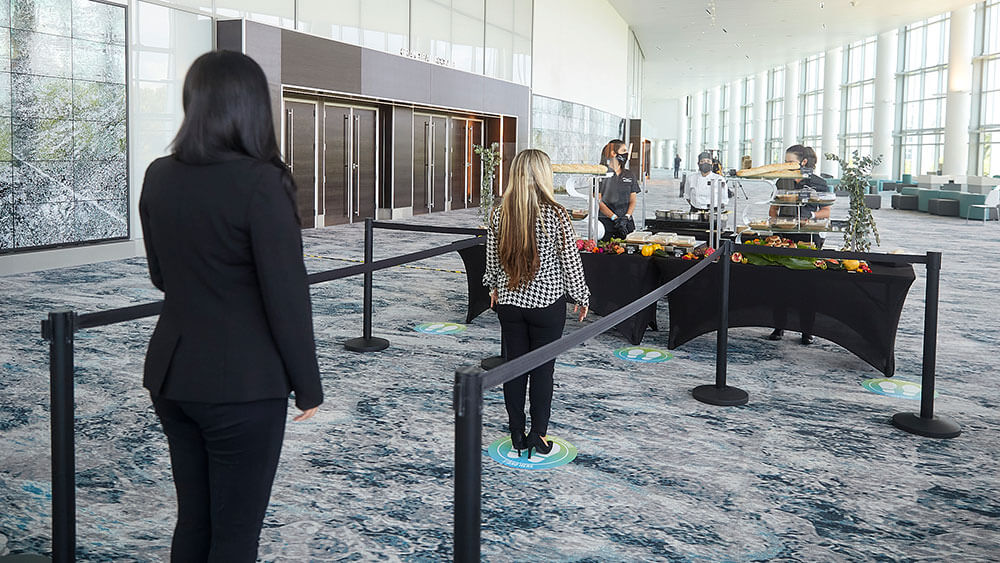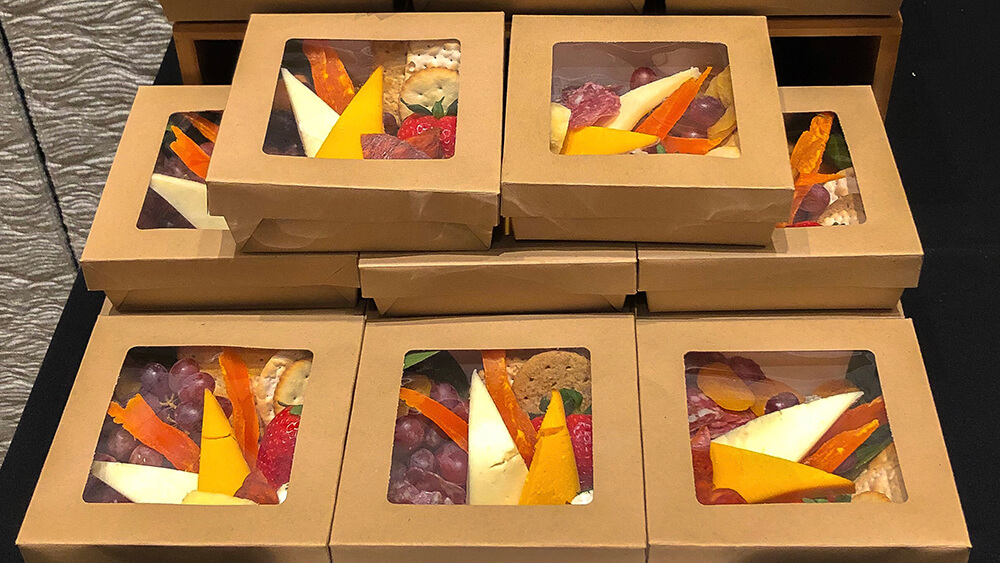
After the pandemic began, Centerplate changed F&B service at the Miami Beach Convention Center to food stations with takeaway-style fare.
When Sodexo and Centerplate conducted an online survey in November 2020, they asked 202 event and meeting planners what they value when it comes to food and beverage in the COVID-19 environment. Eighty-three percent responded that F&B is very or extremely important to the success of their event. A 2018 survey conducted by the same group yielded a similar response, so not much has changed during the pandemic in terms of the large role F&B plays in face-to-face events.
What has changed, the 2020 study found, is that nearly six out of 10 respondents expect total attendance at their next largest, most important event will shrink by between 11 percent and 20 percent, and 44 percent expect their budget to decrease. At the same time, organizers conveyed that they expect more from their providers than ever before.
“Event planners would like venue food and beverage providers to focus on a few key things post-COVID-19,” the report concluded, “including contactless services; effective communications and signage; health, safety, and cleaning services; and innovation around serving large groups without buffets.”

One solution for post-COVID catering at the Vancouver Convention Center is a contactless ordering system.
That’s a tall order for both sides. An expectation for more services for fewer attendees and a smaller budget to work with on the planner side; less revenue and yet more resources required on the supplier side. On top of those challenges sits the largely unasked question of sustainability. Will the need for pre-packaged convenience and perceived safety be prioritized over the still urgent need to reduce food and packaging waste? According to Centerplate, both suppliers and planners are making an effort to balance concerns around safety and health with environmental considerations.
Staying the (Main) Course
Despite the short-term demand for takeaway-style fare, the Baltimore Convention Center (BCC) says that its team is intent on not losing strides they’ve made in sustainability. That has been a major focus for the venue, which was one of two to participate in a 2018 food-waste reduction study in partnership with the World Wildlife Fund.
“Meeting planners so far have understood the importance of safety first,” said Michael Barrett, regional vice president at Centerplate, the Baltimore Convention Center’s F&B provider.
“We have informed them that sustainability efforts are still a top priority for us and we continue to focus on compostable products, but our top priority will always be reducing food waste and identifying food-waste diversion programs. Even though our scope of service may have slightly changed due to COVID, our commitment to being a leader in sustainability efforts has not.”
Paul Pettas, director of communications and public relations for Centerplate at large, said that they are investing in sustainable, individually portioned service boxes and portals for cashless transactions. “We see planners wanting to return to a semblance of normalcy, when the safety protocols allow,” he told Convene via e-mail. However, he doesn’t necessarily foresee a major shift for the future. “We don’t see buffets or receptions, or large events going away in the long term.” In the meantime, he says, Centerplate facilities will offer health ambassadors who will help liaise between organizers and on-site F&B teams and local health departments.

The Orange County Convention Center in Orlando, whose food service is organized by Centerplate, currently uses recyclable food containers.
‘Death of the Buffet’
Molly Crouch, director of sustainability at Centerplate, also sees these changes more as a temporary detour — but they serve to shine a spotlight on where there is room for improvement.
“I don’t believe there was a significant step back to the days of old — like using Styrofoam, for example,” she said. “It was more of a sidestep to using recyclable materials versus compostable materials or even a mix of both, because recyclable products are still leaps and bounds ahead of compostable in their ability to seal food and beverages in safe, durable containers.”
RELATED: Environmental Silver Linings Brought to Us by COVID-19
Although compostable materials are catching up to recyclable products, Crouch said, “it was difficult to predict how people were going to feel about food safety when the pandemic hit, leading us to the sidestep. I also feel that there was more of a conscious effort on our industry not to erase the seismic shift that had already been made over the last decade in regard to using more renewable, earth-friendly materials.”
Some see potential for a positive to come out of the restrictions COVID has imposed — the extinction of the self-serve buffet. “The buffet is gone,” Steven Kamali, CEO of Hospitality House, told HotStats. “Hotels are now thinking about how they can provide service that falls somewhere between a vending machine and a full-service breakfast, and that’s where people are trying to innovate.”
This is the hope of Guy Bigwood, chief changemaker at the Global Destination Sustainability (GDS) Movement, which works with destination management professionals to create more resilient tourism destinations. “I think in the short term we’ll see the death of the buffet,” he said in a recent phone interview with Convene. “And buffets are one of the biggest wasters of food. So, there’s both — disasters and silver linings.”

Guy Bigwood
What Science Tells Us
Fomite transmission, or the spread of disease via contaminated surfaces, has been ruled out by experts as a means by which COVID-19 spreads, and in April 2021, the CDC updated its guidelines with more firm language to reflect that. Which begs the question: Does this make disposable or single-use items an unnecessary measure — and can providers begin to phase them out? Centerplate said we’re not quite there yet.
“Even with the change in CDC guidelines, we feel our best chance for success is to ensure that we are making people feel comfortable,” said Centerplate’s Michael Barrett. “We understand clients’ hesitation still with travel and events and want to do our part to make our food service be the last thing they worry about. We will continue to work closely with our clients to address their concerns while also bringing a sense of normalcy back to events.”
GDS-Movement’s Guy Bigwood points out that this is an opportunity for the industry to step up and thoroughly communicate what’s necessary and what’s not, according to the latest scientific guidance until public perception catches up. “[It’s] a big myth that needs to be addressed,” he said. “If you look at most of the research, disposable is actually not safer. Some things need to be done in a different way, but not everything. We need to look at data around that to drive decision makers, that’s the real key.”
Jennifer N. Dienst is managing editor at Convene.
